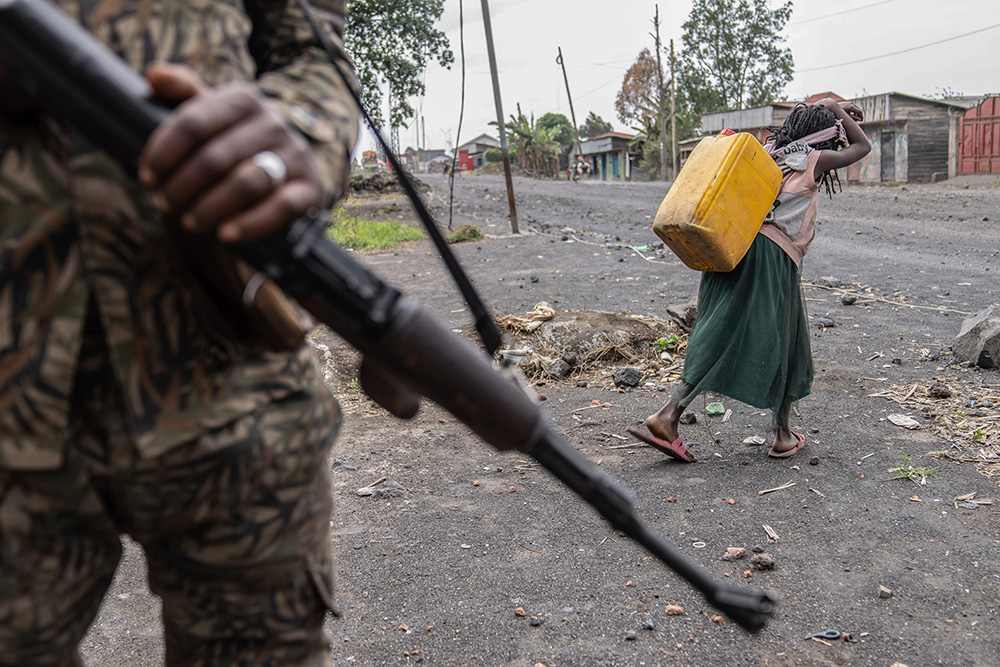
A child carrying water walks past militia forces fighting M23 rebels in Sake, Democratic Republic of the Congo, on Aug. 31, 2024. (AP/Moses Sawasawa)
Editor's note: This story is part of Global Sisters Report's yearlong series "Out of the Shadows: Confronting Violence Against Women," which will focus on the ways Catholic sisters are responding to or are affected by this global phenomenon.
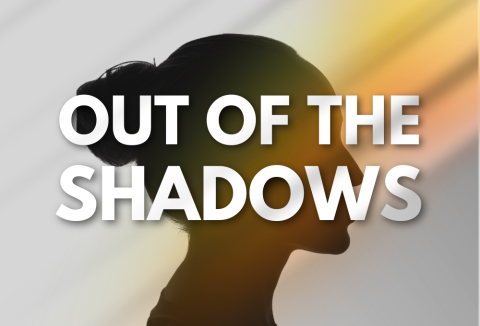
(GSR logo/Olivia Bardo)
Josephine Mbiya, wearing a green skirt and a black blouse, emerged drenched after crossing the Rusizi River into Cibitoke, a city in northwestern Burundi. She let out a sigh of relief, having successfully escaped the threat of rape and other forms of sexual violence from rebels and soldiers in the Democratic Republic of Congo.
"They don't want to see anyone in a skirt. They are raping everyone — children, young girls, women and the elderly," mourned a 32-year-old mother of one from Bukavu, the capital of South Kivu province in eastern Congo.
Mbiya chose to risk her life by swimming across a raging river teeming with hippos and crocodiles, rather than stay at home and face the threat of rape from either rebels or soldiers. Tragically, her 11-year-old son drowned while attempting to swim across the river to reach Burundi and escape being conscripted by the rebels.
"Rebels and soldiers are everywhere, searching for women to rape," she said, emphasizing the severe impact of the war between the Congolese army and the March 23 Movement, also known as M23. The war escalated in late January.
Mbiya's riveting escape and the death of her son illustrate one of the great, overlooked tragedies unfolding in the world today. Thousands have been killed and hundreds of thousands have fled in midst of what the United Nations has described as a campaign of "serious violations of international law involving the targeting of women and children in situations of armed conflict in the DRC including killing and maiming, sexual violence, abduction, and forced displacement."
To document the unfolding diaspora and the horrors of the decadelong war, NCR's Global Sisters Report went to Central Africa and interviewed victims and their families — and the Catholic sisters who work to care for the people trapped in the continuing warfare.
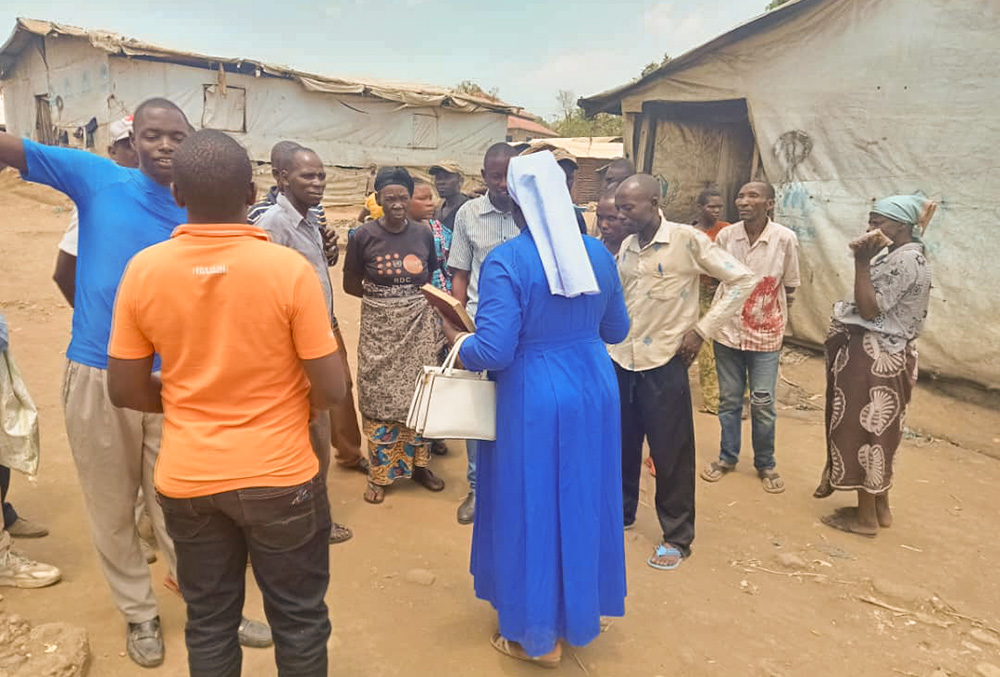
A sister visits displaced individuals, including women and girls, in a camp in the eastern town of Goma, Democratic Republic of Congo. (Courtesy of Caritas)
Nearby Uganda is also welcoming thousands of Congolese women and girls who have escaped rape and other forms of sexual violence, each sharing their horrific experiences. Hellen Matenga was among those who recently crossed the border with dozens of other women and girls after fleeing from armed fighters in Goma, the main city in northeastern Congo.
"The M23 attacked our village during the capture of Goma, raping women, and killing those who refused," the 27-year-old said, struggling to hold back tears. "Three soldiers raped me until I lost consciousness, and when I regained my senses, I fled to Uganda to escape more rape."
The conflict in Congo stems from the aftermath of Rwanda's 1994 genocide and the fierce competition for Congo's rich mineral resources, vital for electric vehicle batteries and electronics. This year, the M23 rebel group has dramatically escalated the violence, capturing key territories, including the cities of Goma and Bukavu.
The Congolese government reports that at least 7,000 people have died in the fighting since January. According to the United Nations, an estimated 7.8 million people are currently displaced in Congo. Since January, at least 700,000 people in Goma alone have been forced to flee their homes.
International powers accuse Rwanda of arming and supporting the M23, but Rwanda asserts that its forces are acting in self-defense against threats from the Congolese army and local militias.
The Office of the United Nations High Commissioner for Human Rights has issued a warning that the warring parties are increasingly using rape and sexual violence as weapons of war.
"Amid the chaos, hundreds of children have been separated from their families, exposing them to heightened risks of abduction, recruitment and use by armed groups, and sexual violence," UNICEF's executive director, Catherine Russell, said in a Feb. 13 statement. The sexual violence against children by armed groups, she said, is "surpassing anything we have seen in recent years."
Catholic leaders, including religious sisters active in the region, say that thousands of women and girls have sought refuge in neighboring countries such as Uganda, Burundi and Rwanda to escape sexual violence. The number of those fleeing increased earlier this year following the invasion of the region by M23, they said.
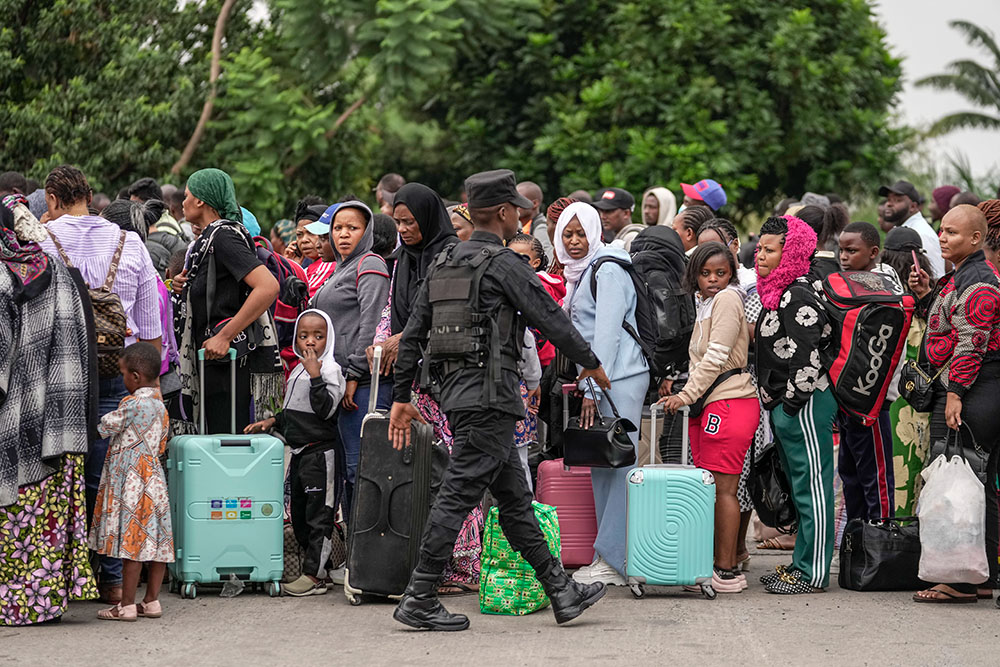
Rwanda security officials check people crossing from Congo in Gisenyi, Rwanda, Jan. 29, 2025, following M23 rebels' advances into eastern Congo's capital Goma. (AP/Brian Inganga)
Sexual violence, a form of gender-based violence, encompasses rape, sexual abuse, harassment, exploitation and forced prostitution.
"Sexual abuse is real and very present in the ongoing war," said a Teresian Carmelite nun based in Goma. She works to support refugees, particularly women and children, by providing essential items and offering counseling to help them recover from experiences of sexual violence.
"Women and children are suffering the most from the war," she said. "They are subjected to rape, and their dignity is being eroded, with little they can do because the perpetrators are armed."
A monsignor from the Bukavu Archdiocese, who has worked in the region for over a decade, said that the area has experienced conflict for more than 30 years. During this time of conflict, he said, rising levels of gender-based violence are also occurring within families.
The prevalence of sexual violence
A recent visit by Global Sisters Report to homes, villages and camps on the outskirts of Goma and Bukavu revealed that many women and young girls have been brutally sexually assaulted by armed men during the three decades of conflict in eastern Congo.
Many individuals told GSR that armed men, particularly those from M23, have sexually assaulted and raped them — including instances of gang rapes — in their homes, camps, schools, fields, or while engaging in other daily activities.
'I don't think there is a single woman living here who hasn't been raped by these soldiers.'
GSR conducted interviews with 20 women and girls from various families in Sake, a town near Goma. Each of the interviewees confirmed that they had been sexually assaulted by the M23 group during and after the takeover of the town in January.
In other interviews with more than 50 women and girls taking refuge in a school in Goma — after fleeing from internally displaced persons camps due to the M23 conflict — GSR found that all of them had been sexually assaulted by M23, particularly during the time when M23 captured the city of Goma in late January.
"I have been raped three times by different armed men since January," said a woman from Sake, explaining that this has become a common experience since rebels took over the town. "I don't think there is a single woman living here who hasn't been raped by these soldiers."
Advertisement
A nun from the Oblate Sisters of the Assumption who works as a nurse in Goma told GSR that the situation is so severe, they have been unable to keep track of the number of people seeking treatment for rape.
"We are receiving many girls and women at our hospital," she said. "I don't have the exact figures because the number keeps increasing. The rape crisis can only end if the war stops."
The United Nations reported a tragic incident on Jan. 27 in Goma where at least 165 female prisoners were raped and burned to death during a jailbreak. This occurred while the M23 rebel alliance clashed with Congolese forces for control of the city, resulting in more than 4,000 detainees escaping.
In Bukavu, GSR discovered that the majority of women and girls had fled to neighboring Burundi as M23 advanced toward the city. The few who stayed behind became victims of rape by M23 after the rebels captured Bukavu in February, according to GSR's findings.
"The women began to escape the threat of rape when they heard that M23 was approaching the city," said a monsignor from the Bukavu Archdiocese. "There weren't many women left, and those who stayed behind became victims of sexual violence at the hands of both the rebels and Congolese soldiers."
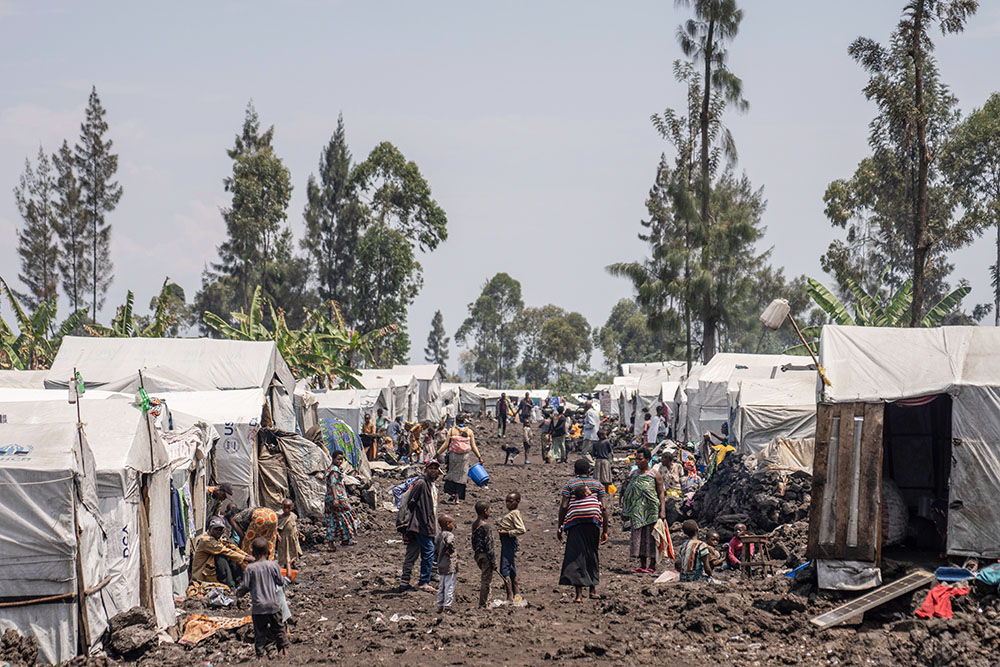
Internally displaced people fleeing the ongoing conflict with M-23 rebels gather in the Blushagala camp outside Goma, Democratic Republic of the Congo, on Aug. 29, 2024. (AP/Moses Sawasawa)
These findings are supported by the U.N. refugee agency, UNHCR, which has reported that nearly 80,000 people have fled the country due to insecurity and horrific sexual violence amid the ongoing fighting in eastern Congo. This number continues to rise daily. Of those displaced, approximately 61,000 have sought refuge in Burundi.
According to UNHCR, 60 cases of rape are reported every day. In the last two weeks of February, a total of 895 incidents were reported to humanitarian organizations.
When GSR questioned Willy Ngoma, the military spokesman for the M23 armed group, in February about the rape accusations against his soldiers, he dismissed the allegations: "We don't do that. We are here to fight and liberate our people from the oppression of this regime."
Rape and sexual trauma
Sexual violence has had profound psychological, emotional and physical effects on many survivors since the war began, and these impacts have recently intensified. The trauma of being raped or sexually assaulted has left many feeling shattered, scared, ashamed and alone. Survivors often experience nightmares, flashbacks and other distressing memories.
'Six armed men invaded our house in the middle of the night and they all raped me and killed my husband when he tried to stop them.'
One woman shared with GSR her struggles with sleep following an incident of sexual violence she experienced at the hands of M23 rebels. The 38-year-old mother of four, who resides in Sake, recounted how several rebels raped her in front of her family, including her children, during an attack on the town on the night of Jan. 23.
"Six armed men invaded our house in the middle of the night and they all raped me and killed my husband when he tried to stop them," she recalled, pain written all over her face.
"Now, I am experiencing nightmares every night. I often feel as if they are raping me again, and I start shouting for help in the middle of my sleep. I wake up to pray, but it continues when I fall back asleep."
In Goma, another woman shared with GSR that her husband left her earlier this year after M23 rebels, dressed in military uniforms, invaded their home on the evening of Jan. 27 and raped her in front of him.
"I am stressed because my husband no longer wants me back," said the 30-year-old mother of three, who is now pregnant as a result of the rape. "I don't know what to do with this pregnancy. Sometimes, I always think of committing suicide just to forget what happened to me."
A Teresian Carmelite nun said that the sisters are urgently trying to deliver essential medical, mental health, and socioeconomic services to survivors of sexual violence in eastern Congo. However, their movement and safety have been restricted by rebels controlling the region.
"When some of these women and girls experience sexual abuse, they come to us on their own," the nun explained. "Those who arrive within 72 hours after the rape or sexual assault are lucky because they can receive immediate treatment to prevent sexually transmitted diseases."
Despite the ongoing danger in Goma and the surrounding towns due to the presence of the M23 group, the nun said they feel "compelled to search for victims of sexual violence within the town or in their homes whenever they learn of incidents of sexual abuse."
Meanwhile, a nun from the Oblate Sisters of the Assumption told GSR she and her fellow sisters have been providing daily counseling by discussing the experiences of victims of sexual violence and the impact on their lives. This support, she said, is aimed at helping them in their healing and recovery process.
"There are many victims, but we are assisting them with trauma healing, as well as offering medical checkups and treatment," she said. "Our only prayer is that this war ends soon so that all women and girls can be saved from rape."
Ameen Auwalii contributed to this report from the Democratic Republic of Congo.







